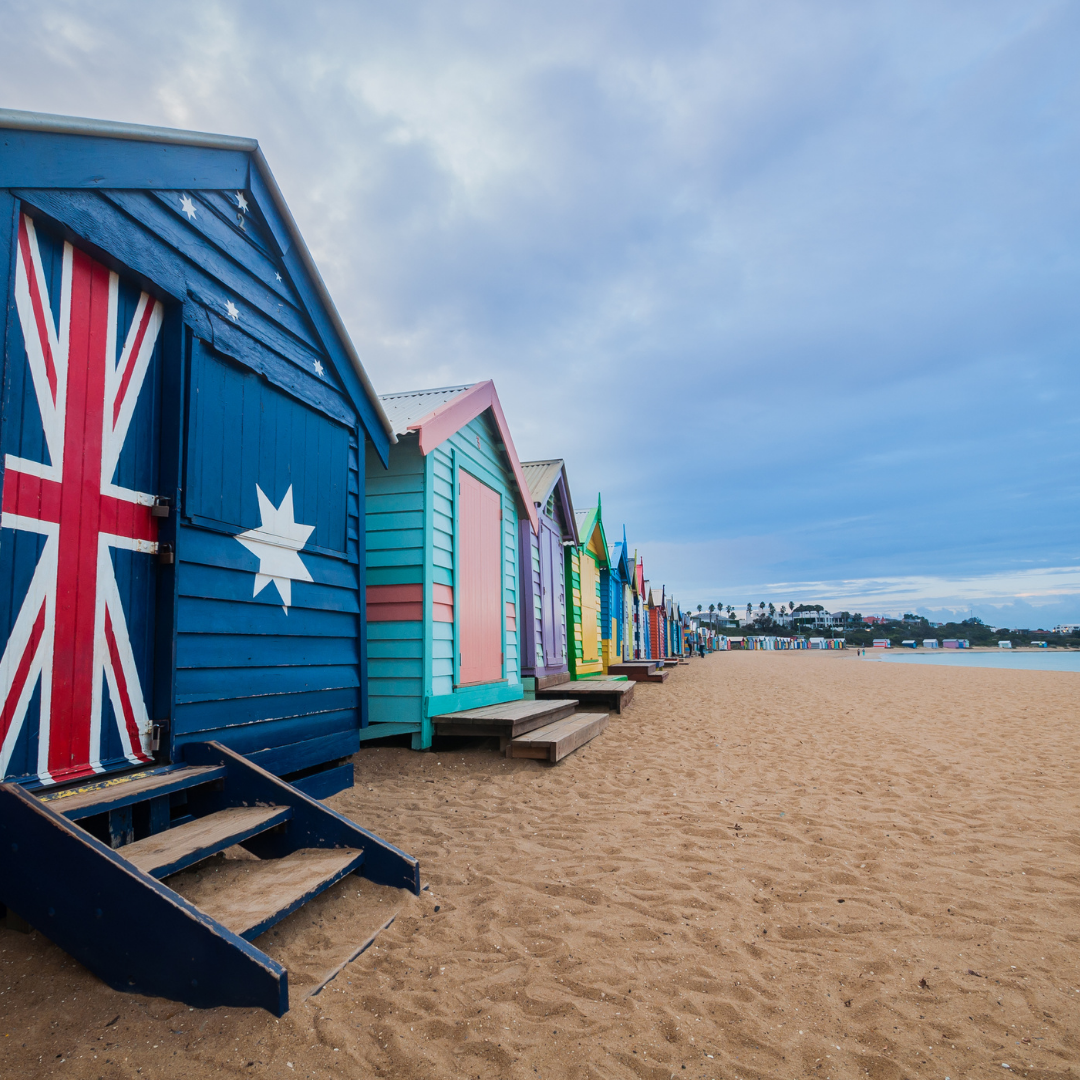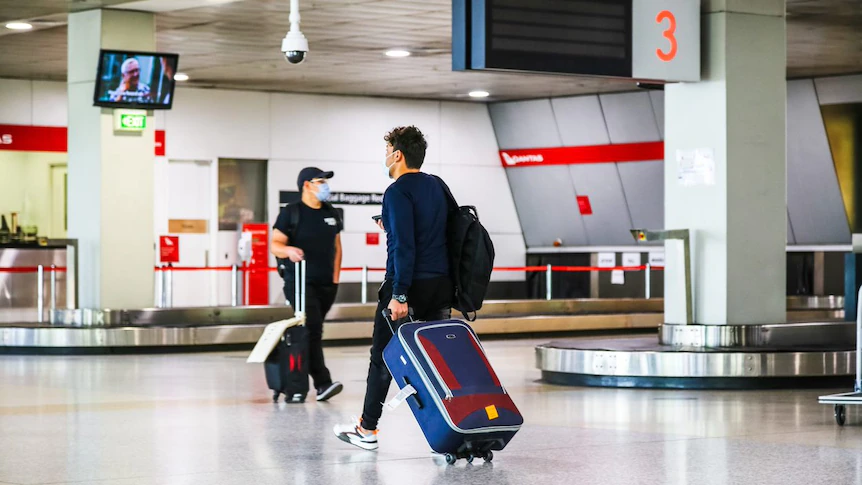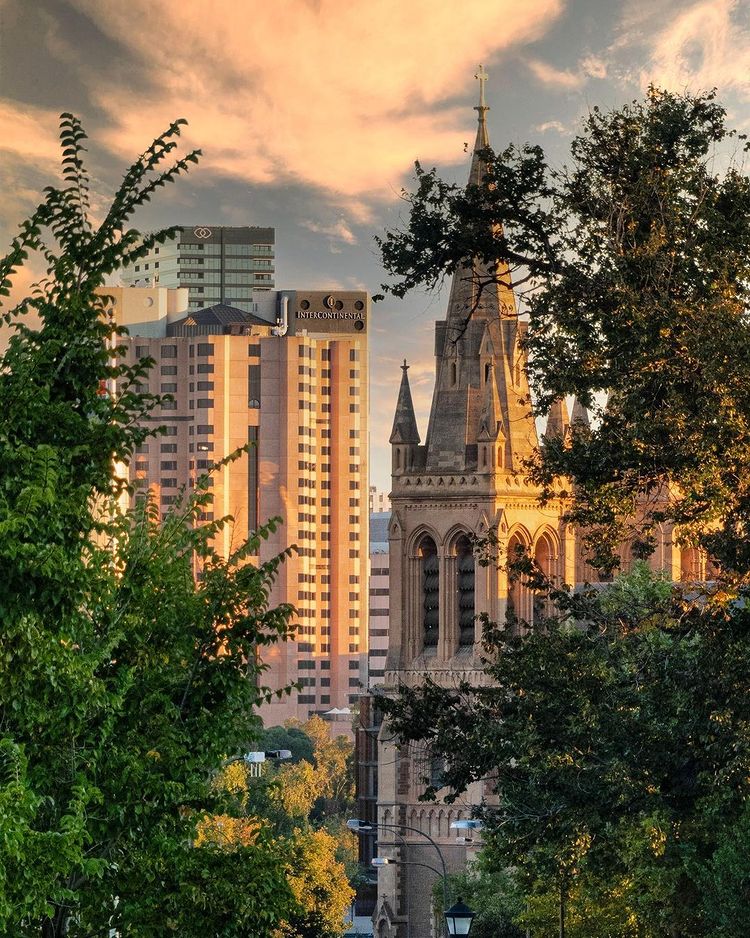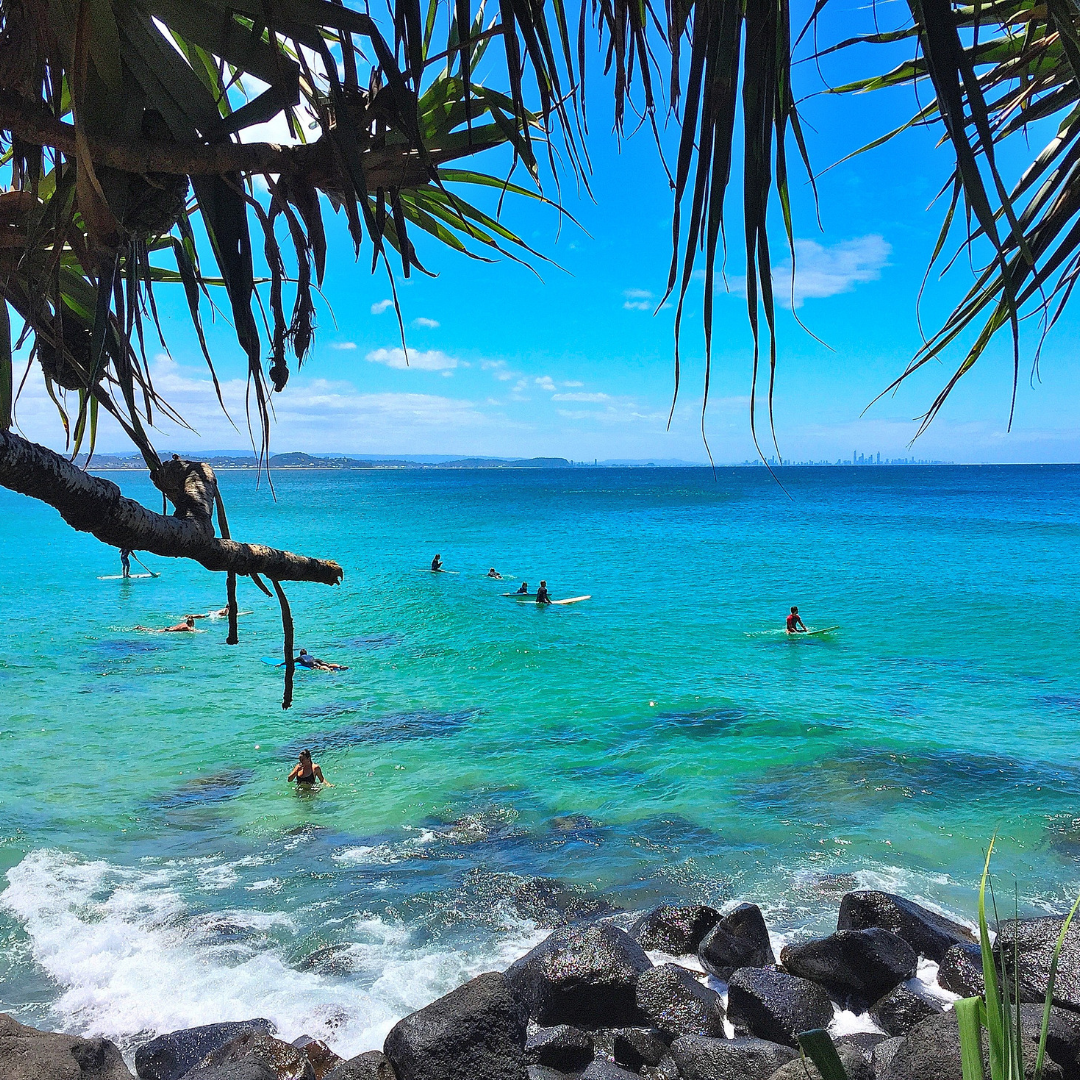Australia is known as the “land down-under”. With a population of just under 26 million and an area of 7.692 million kilometres, we share a lot of space!
The original occupants of this land, the Aboriginal and Torres Strait Islanders, have been here for over 65 000 years, while Europeans have lived here for just over 200 years.
Australians are a friendly bunch who love the great outdoors. They can be found swimming at our stunning beaches, camping in the natural bushland, or gathering for an Australian outdoor barbeque on the weekends.
If you have not made up your mind about where on this vast island you would like to study and work, we will look at the main cities where this is possible and what is available for you.
So, fasten your seatbelt a while we take a tour around the amazing country that is Australia.
Sydney – big city, bright lights
If you are attracted to big cities with exciting nightlife and some of Australia’s major tourist attractions, then Sydney, Australia’s largest city, could be the city for you. Sydney is the capital city of New South Wales.
When people think of Australia, they usually picture the iconic Sydney Harbour Bridge, affectionately named ‘the coat hanger’ by locals because of its distinctive shape.
You may also be familiar with the Sydney Opera House, an architectural wonder designed by Danish architect Jørn Utzon. This multi-purpose entertainment venue is for opera and many Australian and international performers and bands.
Like the rest of Australia, Sydney also boasts some stunning beaches, the most famous being Bondi Beach. Bondi Beach is renowned for having one of the oldest surf lifesaving clubs in the world.
Where can I study in Sydney?
Sydney has the advantages of being a big city so that you can choose from several universities. Sydney has Australia’s most significant international student population in Australia, and it was ranked number eight in the QS World University Rankings in 2022.
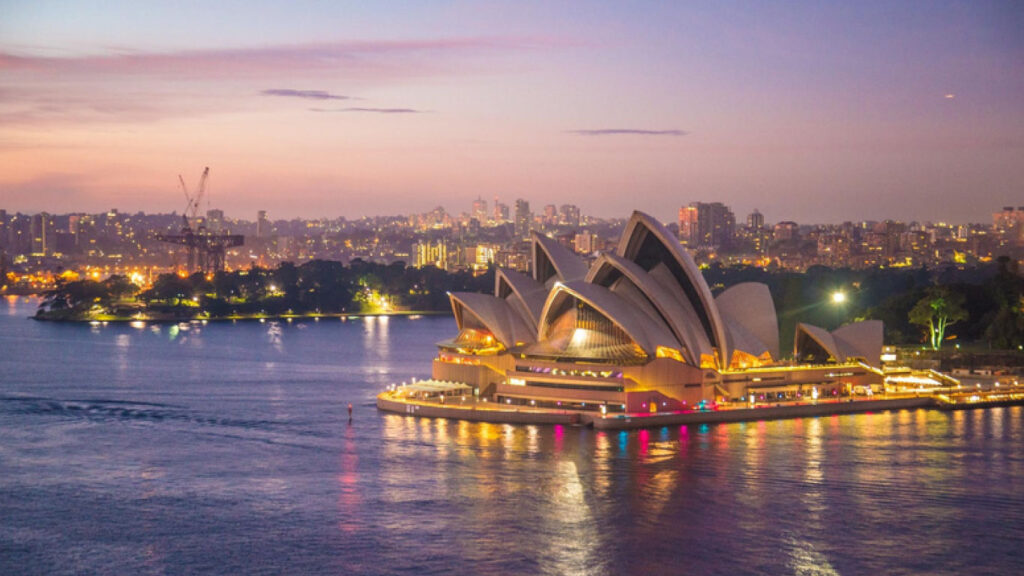
Universities in Sydney
Sydney has six Australian Universities and hosts another eleven campuses in the CBD. The six main universities are:
- Australian Catholic University
- Macquarie University
- University of New South Wales
- University of Sydney
- University of Technology Sydney
- Western Sydney University
- Satellite – Australian Catholic University
- Satellite – Charles Darwin University
- Satellite – CQUniversity
- Satellite – Curtin University
TAFE study options in Sydney
If a university is not your preference, you can attend a Technical and Further Education (TAFE) course; Sydney has the TAFE NSW. This study option offers higher education degrees and pathway programs to international students. TAFE NSW also offers English Language Courses at 5 locations across Sydney.
Where is the best place to learn English in Sydney?
Most universities offer English classes, or you could try some of the independent colleges or TAFE NSW. The fees vary from $250 – $2500 depending on which college or university you choose.
Here are some suggestions:
- International House
- Astley English College
- TAFE NSW
- The University of Sydney – Centre for English Teaching
Where should I live in Sydney?
Sydney is one of Australia’s most expensive cities for a rental property in the suburbs close to the CBD. A one-bedroom apartment in the CBD is around $640/week compared to a cheaper suburb at $460/week. Before you decide where to live, check out Domain for real estate listings.
Some students choose to share rental properties to save money. Websites such as Flatmates.com.au can help you to find share houses or rooms for rent.
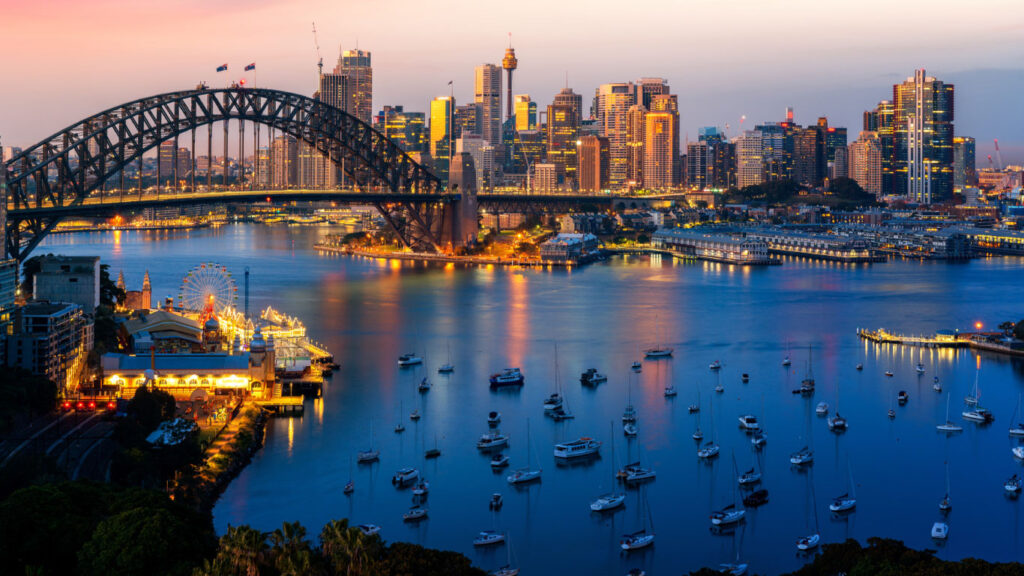
Where can I get work in Sydney?
International students on a student visa can work up to 40 hours per fortnight during the semester and unlimited hours during holidays. There are strict conditions for students on a working visa. See the Australian Government conditions here.
Sydney has a thriving hospitality industry. There are always casual or part-time jobs in the many cafes, restaurants, and tourist destinations around Sydney. Seek is the website most Australians use to find work.
What to do in Sydney
There is no shortage of things to do in Sydney. You don’t need to spend a lot of money to have a good time; it depends on what you are into. Here is a short list of some things you can do:
- Climb the Sydney Harbour Bridge
- Grab some mates and go for a picnic in the Royal Botanical Gardens
- Take your kids (or your mates) to Taronga Park Zoo
- Head to the Blue Mountains and see the sights
- Learn how to surf at Bondi
- Ride a bike around the coast
- Catch a show at the Opera House
Other Facts about Sydney
How hot does it get?
Sydney has a sunny climate – the winters are mild and summers are warm, perfect for making the most of the outdoors. During summer, average temperatures range from 18.6 – 25.8°C (65.5 – 78.4°F), and average humidity spikes to 65%.
Is it expensive to live in Sydney?
Sydney has some of the most expensive rental prices in Australia. The cost of living will be high if you choose an expensive suburb. If money is a concern, you may wish to move to an area that offers cheaper rent.
Can I catch public transport in Sydney?
Sydney has an excellent public transport system. If you don’t plan to purchase a car, you can get around very quickly via train, bus, and ferry. The website for information about tickets and routes is here.
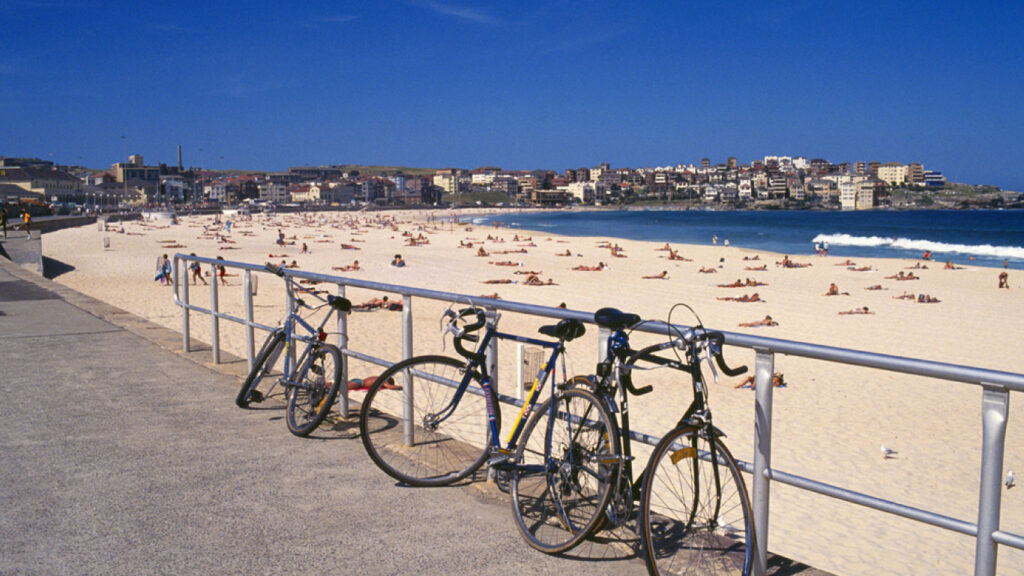
Melbourne – Café culture in Australia
Melbourne is the vibrant cultural centre of Australia. If you enjoy the arts, small bars, cafes, and funky little shops, Melbourne might be the place for you.
Melbourne is the capital city of Victoria, one of Australia’s smaller states (in size). Melbourne is the second-largest city in Australia. Like most of Australia’s major cities, it is situated on the coast. Melbourne is home to Australia’s best-known sporting grounds, such as the Melbourne Cricket Ground and the Rod Laver Tennis Arena.
Where can I study in Melbourne?
As Australia’s second-largest city, Melbourne also has several universities to choose. Most Melbourne universities are within the CBD.
Universities in Melbourne
Melbourne has seven Victorian universities and three satellite campuses to choose from, and the city ranked sixth in the QS World University Rankings in 2022.
- La Trobe University
- Monash University
- RMIT University – City
- Swinburne University of Technology
- University of Divinity
- University of Melbourne
- Victoria University
- Australian Catholic University– ACU Melbourne
- Charles Darwin University– CDU Melbourne
- CQUniversity– CQU Melbourne
TAFE study options in Melbourne
Melbourne Polytechnic is one of the largest providers of Higher Education integrated with Vocational Training in Australia. Education is available for international students and provides education pathways to obtain university entry.
Where to learn English in Melbourne
Most universities offer English classes, or you could try some of the independent colleges or the Polytechnic. Prices range from free – to $2500 depending on where you study.
- Ames Australia
- Primus English
- Speak Better English
- Discover English
Where should I live in Melbourne?
Rent and property prices are not as high as in Sydney. A one-bedroom apartment in the inner-city is around $410/week compared to $390 in the suburbs. There is not as big a difference between CBD and outer suburban rental prices. Before you decide where you want to live, check out Domain for real estate listings.
Some students choose to share rental properties to save money. Websites such as Flatmates.com.au can help you to find share houses or rooms for rent.
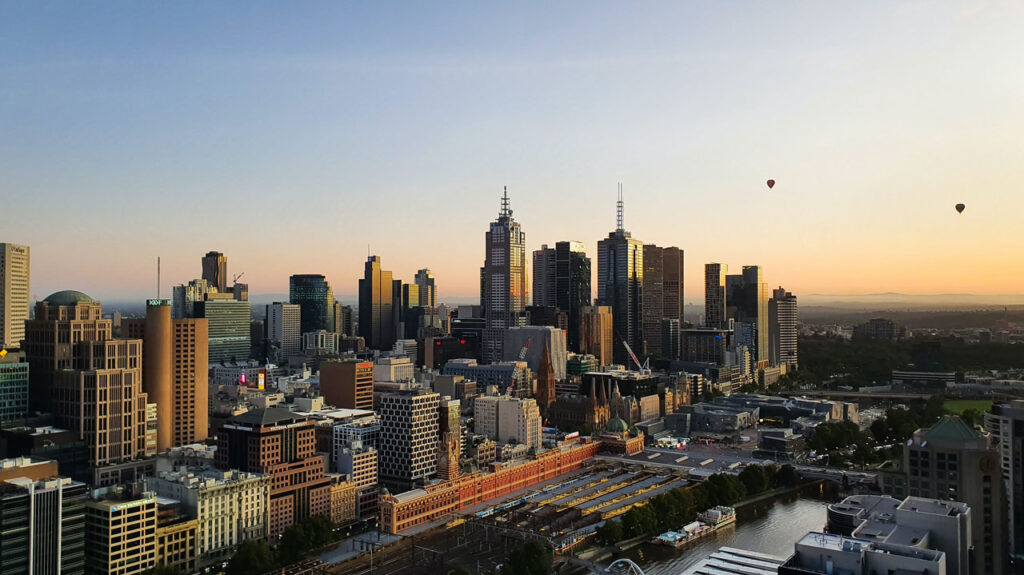
Where can I get work in Melbourne?
International students on a student visa can work up to 40 hours per fortnight during the semester and unlimited hours during holidays. There are strict conditions for students on a working visa. See the Australian Government conditions here.
Melbourne has a thriving hospitality industry. There are always casual or part-time jobs in the many cafes, restaurants, and tourist destinations around Melbourne. Seek is the website most Australians use to find work.
What to do in Melbourne
Melbourne is a city where people love the arts and AFL football with equal love. It has no shortage of things to do, and you don’t need to spend a lot of money to have a good time. Here is a short list of some things you can do:
- Go and see an AFL football match or a cricket match at the MCG
- Visit the Melbourne Zoo
- Go to Federation Square and visit a museum
- Visit Queen Victoria Markets
- Visit the National Art Gallery
- Eat at one of Melbourne’s fine restaurants
- Visit one of Melbourne’s museums
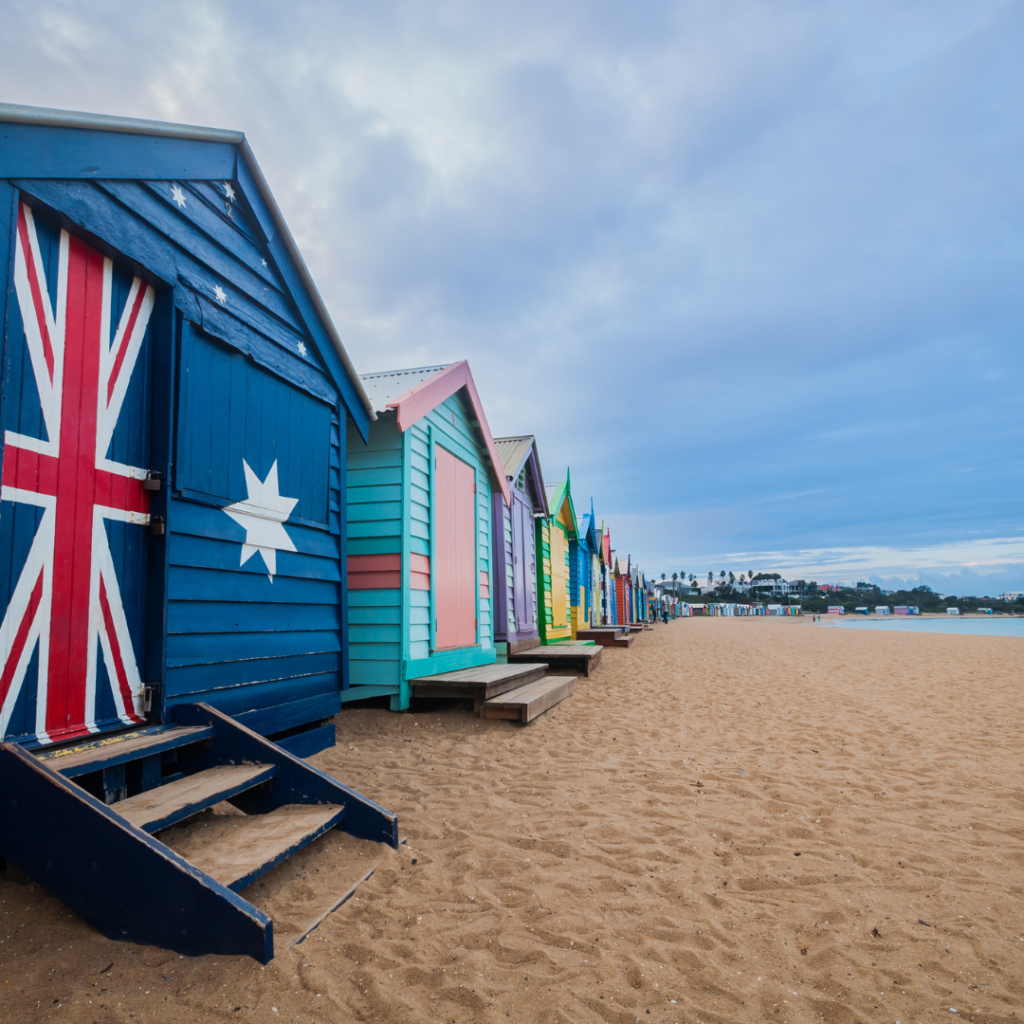
Other facts about Melbourne
Which city is best?
Melbourne and Sydney are rivals for “the best city in Australia”. If you speak to people from Melbourne, they say their city is the best and vice versa. It has been this way forever, usually said in good humour.
How hot does it get in Melbourne?
“Four seasons in one day” is often said about Melbourne’s weather. It can reach temperatures in the mid to high 30 degrees Celsius in summer. In comparison, winter can be very cold, with daytime temperatures of 10 degrees Celsius and overnight temperatures dipping below 0 degrees at times.
Do I need a car in Melbourne?
Melbourne has an effective public transport system of trains, buses, and Melbourne’s famous trams. You can check out the public transport network and requirements here. If you are planning on driving out of the city to explore, you may consider buying a car, but for the CBD, the transport system is excellent.
Perth – city of endless sunshine and beaches
Perth is known for being the most remote city in the world. The stunning Indian Ocean on one side and the Australian outback on the other.
If beaches, outdoor pursuits, and fresh air are to your liking, Perth could be the city for you. Perth enjoys more hours of sunshine than any other city in Australia, and it is the capital city of Western Australia. Western Australia is the mining resources headquarters to the rest of Australia.
Where can I study in Perth?
Although Perth is isolated from the rest of Australia, you can choose from world-class universities.
Universities in Perth
Perth has five main university campuses in the CBD and several satellite campuses in towns north and south of Perth. Perth was ranked 35 in the QS World University Rankings 2022.
- Curtin University
- Edith Cowan University
- Murdoch University
- University of Notre Dame Australia
- University of Western Australia Perth
- Satellite Curtin University Kalgoorlie, Margaret River
- Satellite Edith Cowan University Bunbury
- Satellite Murdoch University Peel
- Satellite University of Notre Dame Australia Broome
- Satellite University of Western Australia Albany
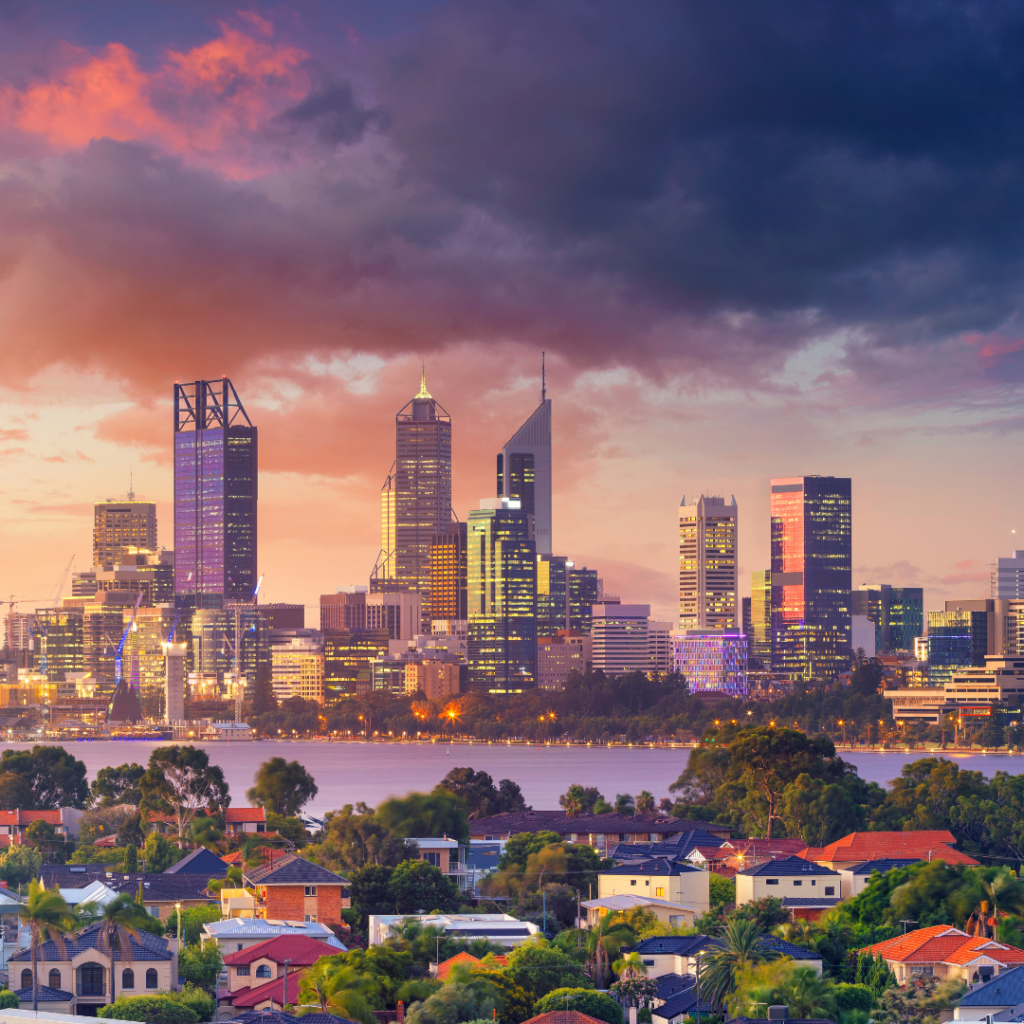
TAFE study options in Perth
TAFE International Perth offers many employment-focused courses and pathways to university for international students. English language intensive courses are also available. TAFE International has 19 campus locations around Perth and Western Australia.
Where to learn English in Perth
Besides the TAFE International English courses, several other places teach English in Perth. Fees range from $695 – $9500
- Kaplan International
- Lexis English
- Language Links International
Where should I live in Perth?
Perth has many suburbs to choose from, north and south of the Swan River. Friendly rivalry exists between those who live north or south of the river. According to the Domain rental report 2020, the median prices for house rental in Perth is $395/week for houses and $340/week for units.
If you live closer to the CBD, rental prices are high, with most rental properties costing more than $600/week. The outer suburbs can be cheaper according to location. Before you decide where you want to live, check out Domain for real estate listings.
For student accommodation in Perth, you could also find share arrangements through Student.com.au
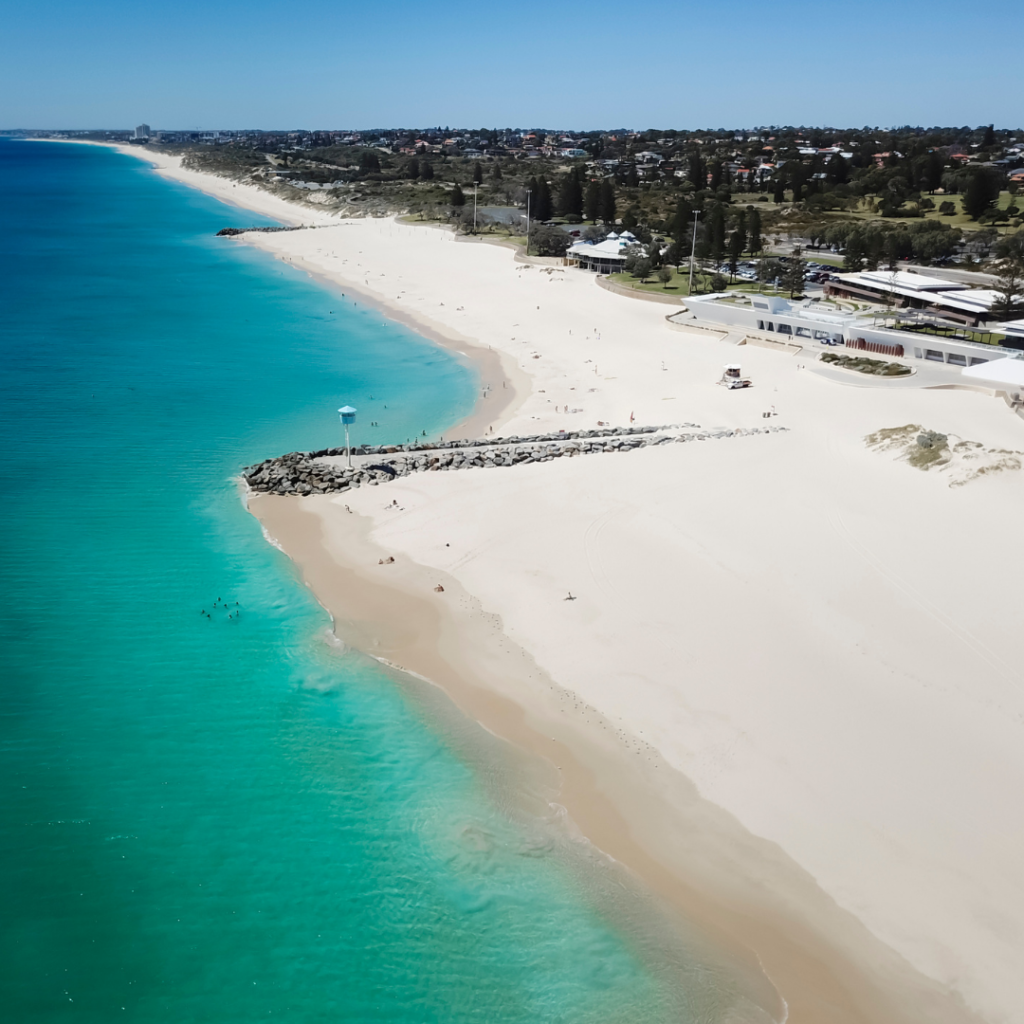
Where can I get work in Perth?
International students on a student visa can work up to 40 hours per fortnight during the semester and unlimited hours during holidays. There are strict conditions for students on a working visa. See the Australian Government conditions here.
Perth has a thriving hospitality industry. There are always casual or part-time jobs in the many cafes, restaurants, and tourist destinations around Perth and surrounding areas. Seasonal fruit and grape picking are available in some of WA’s fruit-growing regions. Seek is the website most Australians use to find work.
What to do in Perth
Perth is very much about the outdoors. If you enjoy beaches and long road trips, you will be pleasantly surprised by what Western Australia has to offer.
If you are a lover of the arts, do not despair Perth also have a thriving arts scene. The International Perth Festival and the accompanying Fringe Festival are a must for any art lover.
Here is a short list of some of the things you can do in Perth:
- Take a trip to Margaret River – where wine and food are abundant
- Learn to surf at one of Perth’s many stunning beaches
- Spend the day in Fremantle – historic port city
- Ride a bike around the bridges of the Swan River
- Go snorkelling with Whale Sharks in Exmouth
- Visit the cultural centre of Northbridge
- Take a zipline across the Swan River
Other facts about Perth
Do I need a car in Perth?
Perth has a public transport system which includes trains, buses, and a ferry. You can find information about tickets and routes here.
If you plan to travel around the great state of WA, a car would be necessary.
How hot does it get in Perth?
Perth is a city of hot, dry summers and mild winters. The temperature in the summertime can climb to climb to 45 degrees Celsius. A heatwave is when the temperature stays above 36 degrees for several days.
Thankfully most days, the sea breeze or the “Fremantle Doctor” (as the locals call it) arrives to cool everyone down in the afternoon! Rainfall usually only happens in winter; the rest of the time, Perth is dry.
What is a sandgroper?
A sandgroper is a strange insect that lives underground in sandy conditions, and it is also the name Western Australians affectionately call themselves.
Brisbane– Beautiful one day, perfect the next
Brisbane, or “Brisvegas” as affectionately known, is the capital of another vast Australian State, Queensland. Brisbane is set on the banks of the Brisbane River and boasts a laid-back lifestyle with a terrific climate.
Brisbane is Australia’s third-largest city, gateway to some of Australia’s major tourist attractions, including the Gold Coast and The Great Barrier Reef. Brisbane has a thriving arts community. You can choose from many galleries, museums, and theatres.
Where can I study in Brisbane?
Brisbane has two central universities and multiple satellite campuses for some of Australia’s other leading universities. Brisbane was ranked 29 in the QS World University Rankings 2022.
Universities in Brisbane
- Queensland University of Technology
- University of Queensland
- Satellite Australian Catholic University
- Satellite CQUniversity
- Satellite Griffith University – 3 locations
- Satellite Queensland University of Technology
- Satellite Torrens University Australia
- Satellite University of Queensland
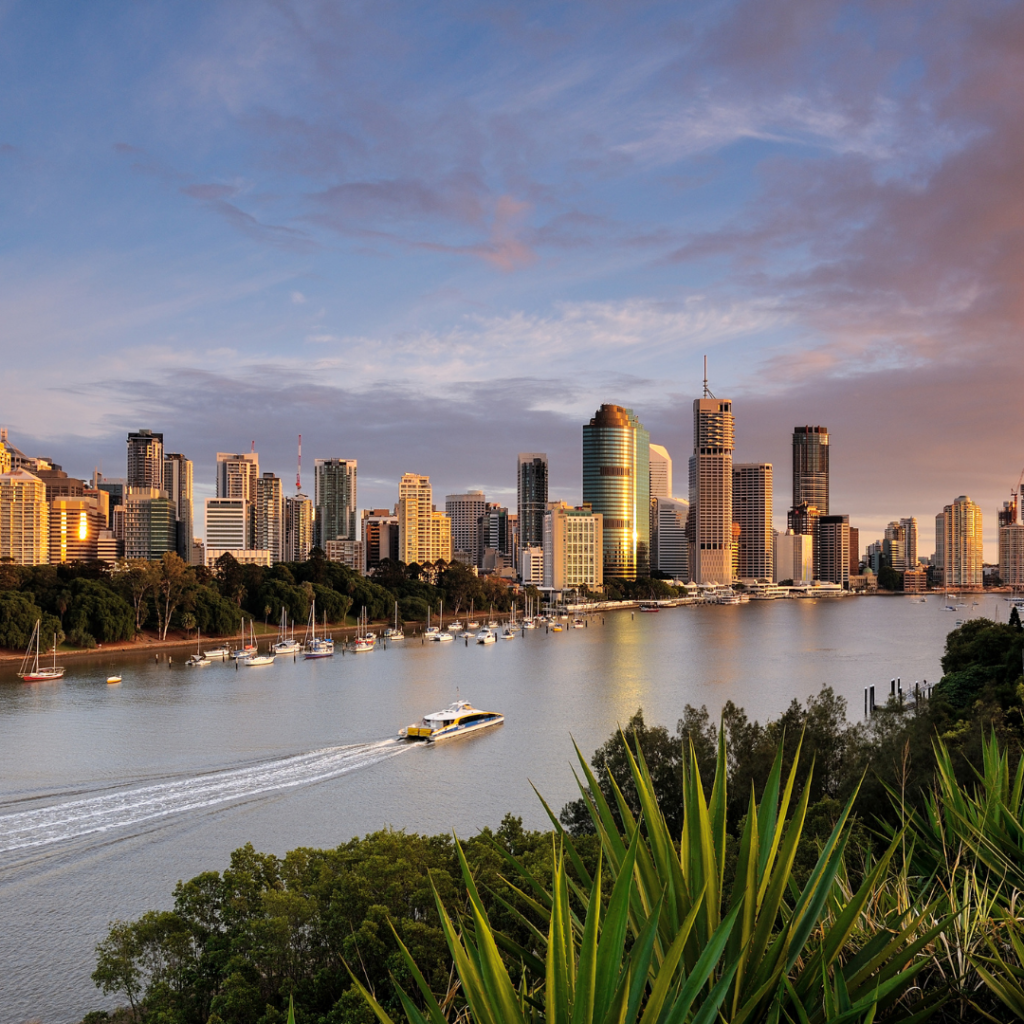
TAFE study options in Brisbane
TAFE Queensland offers courses for international students in entry-level certificates through to advanced level diplomas. English lessons are also available through TAFE Queensland.
Where to learn English in Brisbane
As well as TAFE Queensland English language courses, there are some other alternatives for English lessons in Brisbane. Courses range from $440 – $10 000
- Language Studies International
- Kaplan International
- International House
Where should I live in Brisbane?
Like most major cities in Australia, Brisbane is situated on a river, in this case, the Brisbane River. The CBD in Brisbane is divided into north and south of the river. Depending on where you base yourself, your side of the river will always be better!
Rental prices in Brisbane can vary depending on where you wish to live. Median rental prices for houses are $415/week, with units at $395. Living inner city will be more expensive than in the outer suburbs. Before you decide where you want to live, check out Domain for real estate listings.
For student accommodation in Brisbane, you could also find share arrangements through Flatmates.com.au
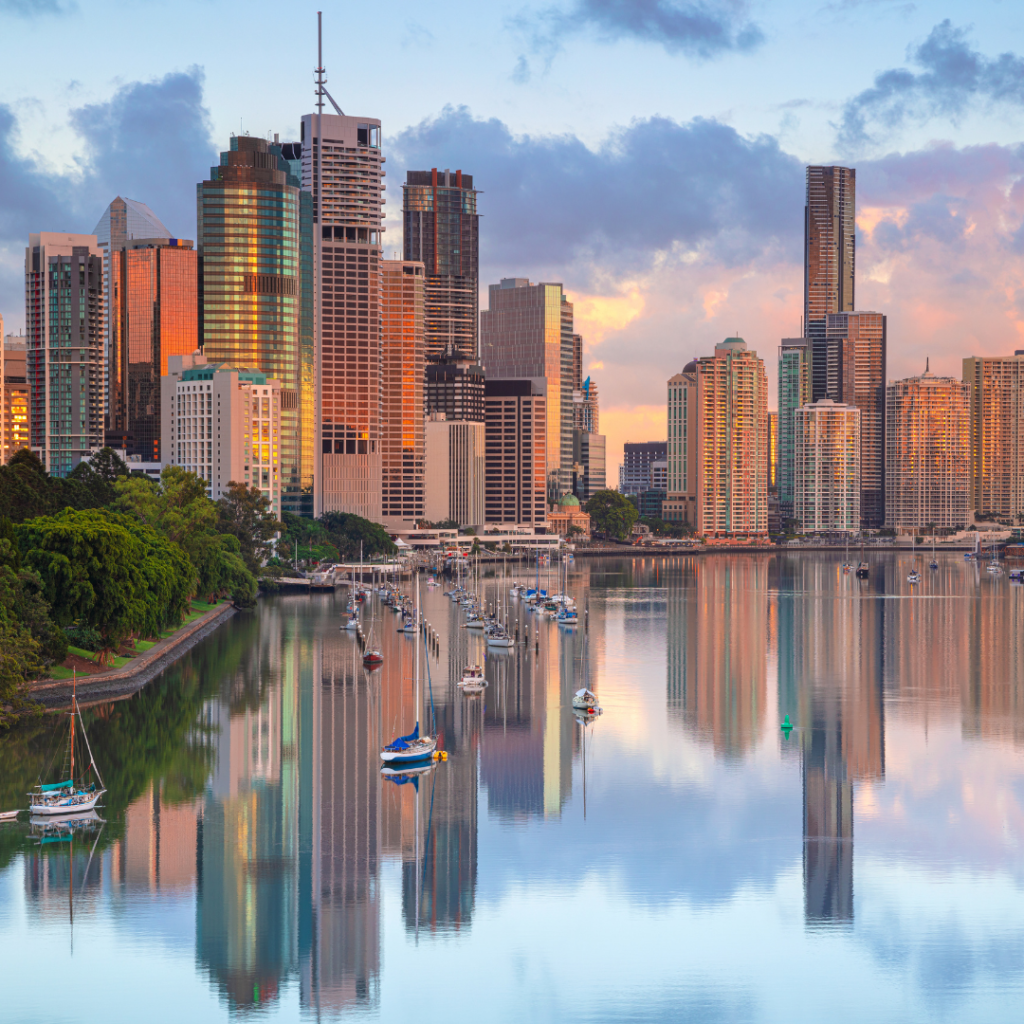
Where can I get work in Brisbane?
International students on a student visa can work up to 40 hours per fortnight during the semester and unlimited hours during holidays. There are strict conditions for students on a working visa. See the Australian Government conditions here.
Brisbane has a thriving hospitality industry. There are always casual or part-time jobs in the many cafes, restaurants, and tourist destinations around Brisbane and surrounding areas. Seek is the website most Australians use to find work.
What to do in Brisbane
As with most Australian cities, Brisbane has a thriving nightlife and many outdoor activities to keep you fit and busy. If you enjoy beaches, the famous Gold Coast is just an hour away from where some of Australia’s iconic beaches are located.
Here is a list of things you can do in Brisbane:
- Visit the South Bank markets and artificial beach
- Go and feast at the outdoor market – Eat Street, North Shore
- Ride a bike or walk the Brisbane Riverwalk
- Climb the Story Bridge
- Hike Mount Coot-tha or explore the Botanical Gardens
- Hug a koala at the Koala Pines Sanctuary
- Road trip to the Great Barrier Reef
Other facts about Brisbane
Do I need a car in Brisbane?
Brisbane has a world-class transport system. As the previous home of the Commonwealth Games, 1982 and World Expo 1988, Brisbane has the transport infrastructure to get almost everywhere by train, ferry, or bus. You can find information about tickets and routes here.
If road-tripping the vast expanse of Queensland is your desire, then a car would be convenient.
How hot does it get in Brisbane?
Brisbane is very humid and sticky, particularly in the summer months. The climate is humid, sub tropical with heavy rains during summer and mild winters. The temperature in the summertime is usually around 35 degrees Celsius and winters 24 degrees with warm nights.
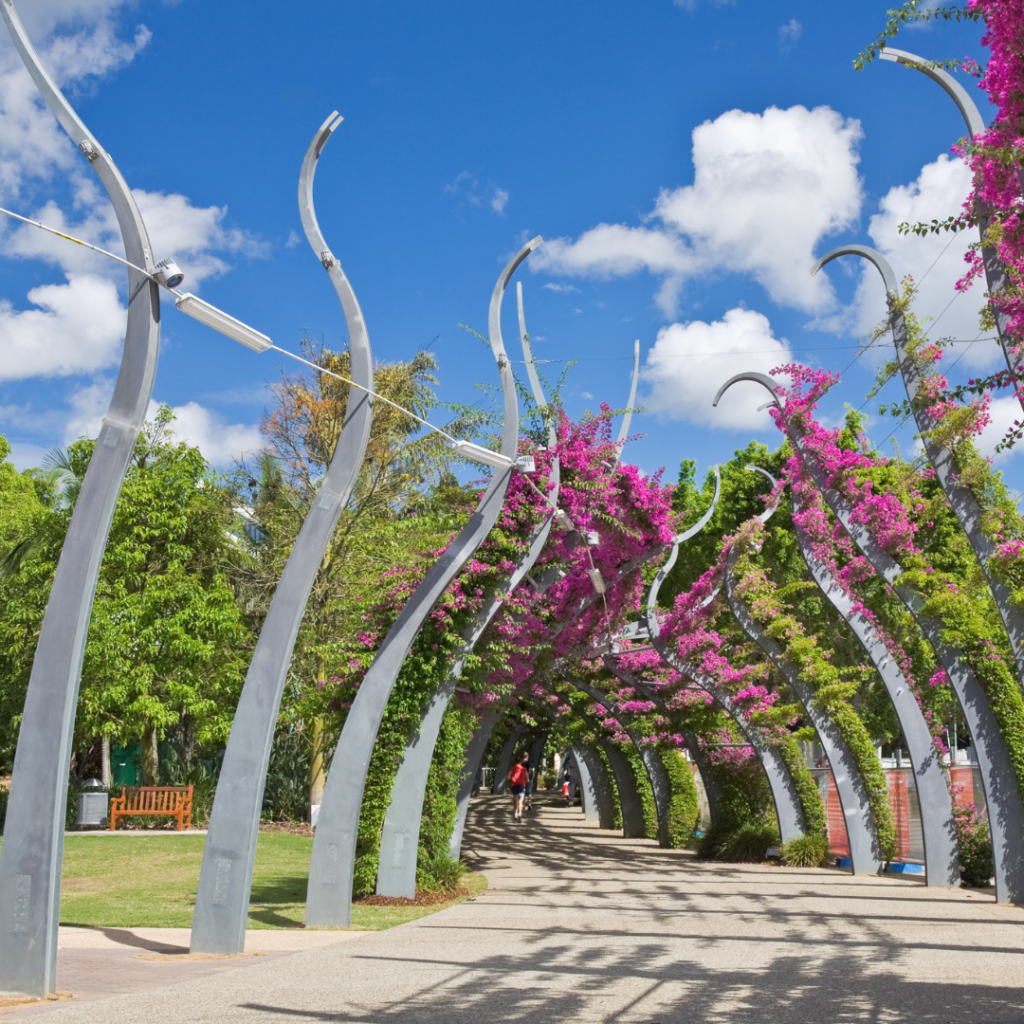
Adelaide – Cosmopolitan coastal capital
Adelaide is the capital of South Australia. Some people call Adelaide the “city of churches” for its numerous churches. Despite this title, Adelaide is a vibrant place to live. Some of the best wines in Australia come from Adelaide Hills, the wine region hours’ drive out of the city.
Adelaide is also known for its festivals and hosting the Tour Down Under Cycling event each year. And if it’s beaches you love, South Australia has white sandy expanses for kilometres!
Where can I study in Adelaide?
For an isolated city, Adelaide certainly has its pick of universities. Adelaide has four leading universities and numerous satellite campuses throughout the state. Adelaide is ranked 108th in the 2022 QS World University Rankings.
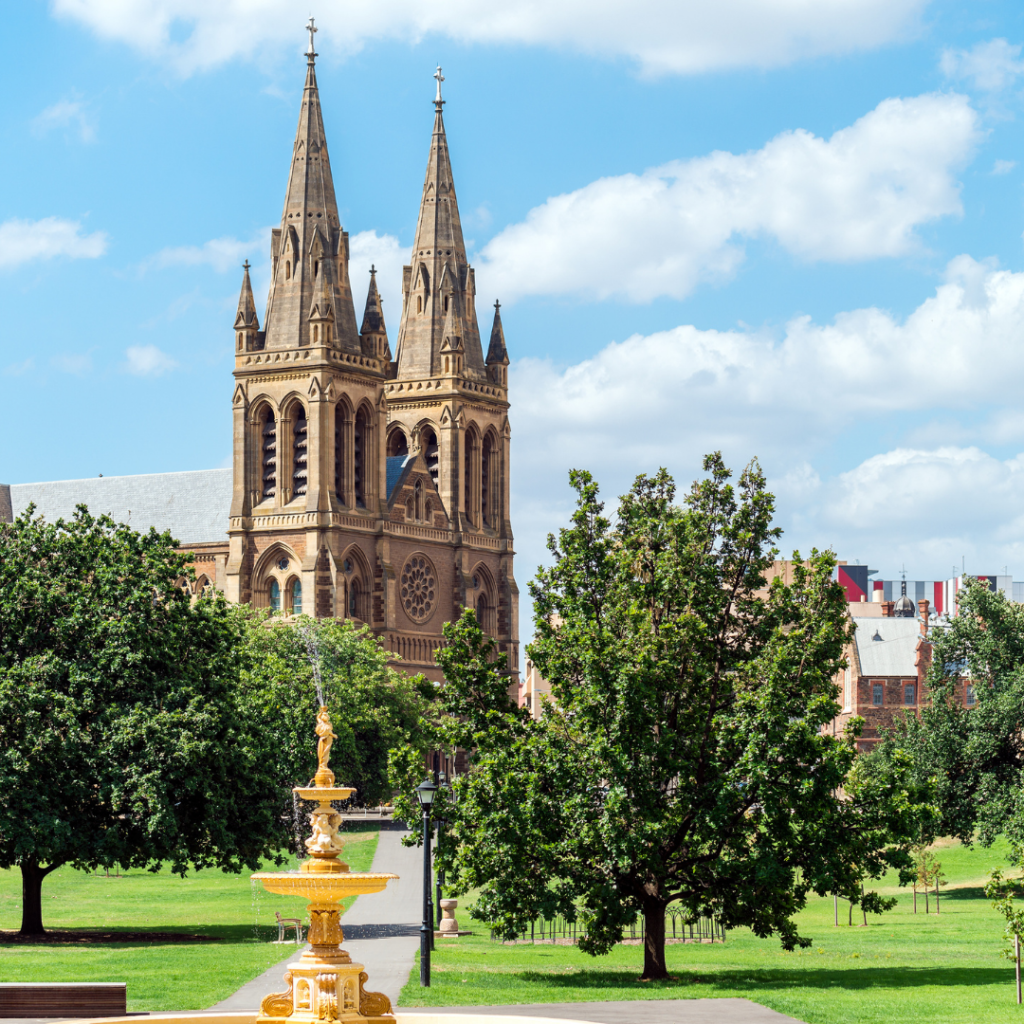
Universities in Adelaide
- Flinders University
- Torrens University Australia
- University of Adelaide
- University of South Australia
- Satellite Australian Catholic University Adelaide
- Satellite CQUniversity Adelaide
- Satellite Flinders University
- Satellite University of Adelaide
- Satellite University of South Australia
TAFE study options in Adelaide
TAFE SA is one of Australia’s largest vocational and education training providers. The TAFE offers vocational courses as well as pathways to university. English language courses are available to international students.
Where to learn English in Adelaide
Aside from the courses offered at TAFE SA, there are some other options available to learn English in Adelaide:
- ILSC Language School
- IELI Language School
- CALUSA (Adelaide University)
Where should I live in Adelaide?
Adelaide is divided into North Adelaide and Adelaide by the Torrens River. If you want to live on the coast, it would be best to choose one of the beautiful beachside suburbs such as West Beach or Glenelg Beach. It is easy to navigate the CBD with beautiful terrace houses and wide streets.
The median rental price in Adelaide for 2020 was $315/week. As with most cities, there are areas with very high rent up to $700/week and suburbs with cheaper rent in North Adelaide.
Before you decide where you want to live, check out Domain for real estate listings.
You could also find shared arrangements for student accommodation in Adelaide through Urbanest Student Accommodation.
Where can I get work in Adelaide?
International students on a student visa can work up to 40 hours per fortnight during the semester and unlimited hours during holidays. There are strict conditions for students on a working visa. See the Australian Government conditions here.
Adelaide has a thriving hospitality industry. There are always casual or part-time jobs in the many cafes, restaurants, and tourist destinations around Adelaide and surrounding areas. Grape picking could be available during the picking season in the Adelaide Hills. Seek is the website most Australians use to find work.
What to do in Adelaide
Adelaide is the home of culture and architecture, and natural wonders. Adelaide’s thriving arts scene and festivals will keep you entertained, and the fabulous beaches and wild coastline will have you mesmerised.
Here is a list of some of the things you can do in Adelaide:
- Head for the Adelaide Hills for a winery tour
- Go to Kangaroo Island on a camping trip
- Check out the Central Markets
- Day trip to Victor Harbour and have a Pie Floater
- Attend a festival
- Visit the South Australia Museum
- Road trip to the Eyre Peninsula
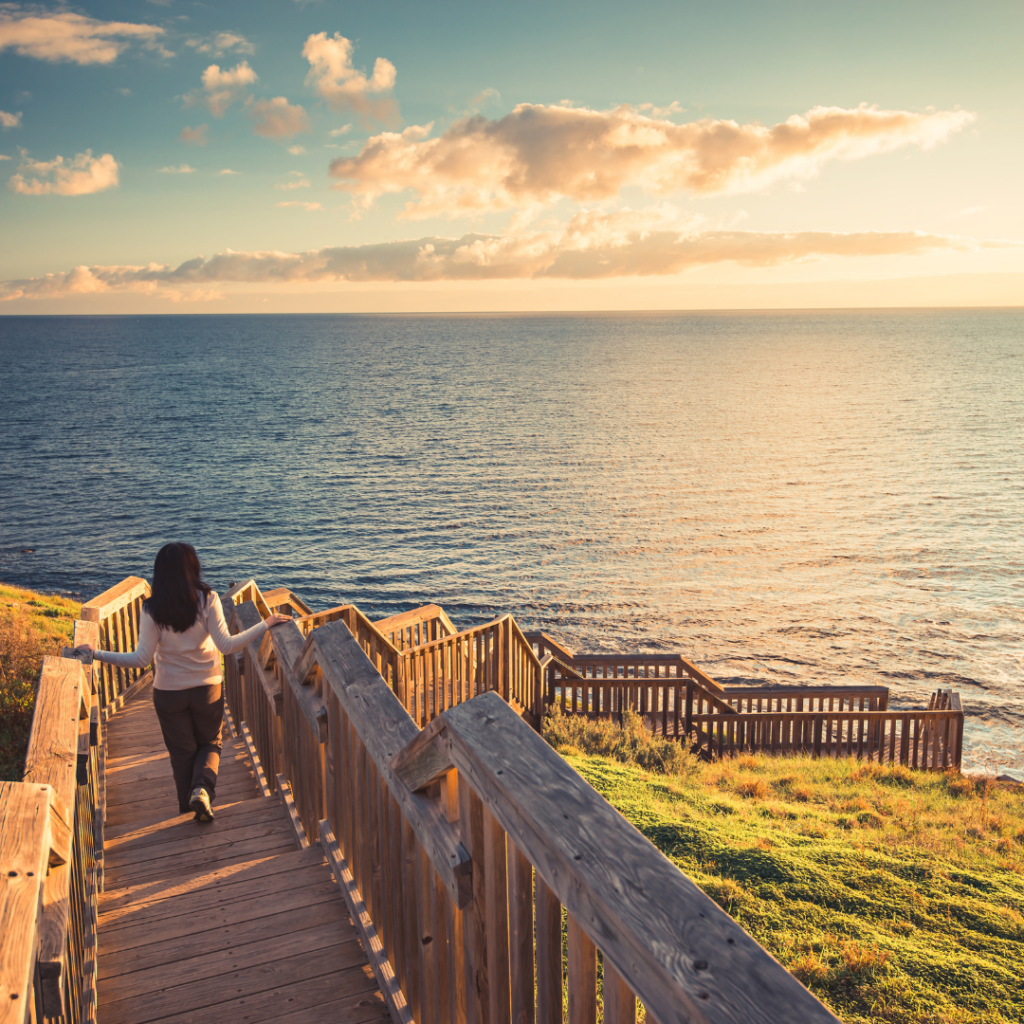
Other facts about Adelaide
How hot does it get in Adelaide?
Adelaide is known for its extreme temperatures in Summer. Heatwaves, where the temperature stays above 36 degrees Celsius for days on end, are common. The climate is Mediterranean with hot summers and mild winters.
Do I need a car in Adelaide?
Adelaide has an excellent public transport system, including buses, trains, and trams. You can find information about fares and routes here. If you want to head out of the city for an adventure, a car might come in handy.
What is a Pie Floater?
A pie floater is a bowl of pea soup with a meat pie floating in it. A local Adelaide delicacy and well worth a try, even if only once!

